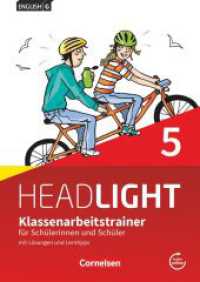- ホーム
- > 洋書
- > 英文書
- > Literary Criticism
基本説明
Focusing on Milton's rejection of dualistic theology, metaphysical philosophy, and early-modern subjectivism, Hiltner argues that Milton anticipates certain essential modern ecological arguements.
Full Description
In Milton and Ecology, Ken Hiltner engages with literary, theoretical, and historic approaches to explore the ideological underpinnings of our prevalent environmental crisis. Focusing on Milton's rejection of dualistic theology, metaphysical philosophy, and early-modern subjectivism, Hiltner argues that Milton anticipates certain prevailing essential ecological arguments. Even more remarkable is that Milton was able to integrate these arguments with biblical sources so seamlessly that his interpretative 'Green' reading of scripture has for over three centuries been entirely plausible. This study considers how Milton, from the earliest edition of the Poems, not only sought to tell the story of how through humanity's folly Paradise on earth was lost, but also sought to tell how it might be regained. This intriguing study will be of interest to eco-critics and Milton specialists alike.
Contents
Preface; Introduction; Part I. Having Place: 1. Pace defined: the ecological importance of place; 2. Place given: Eve as the Garden's spirit of place; 3. Place lost: Eve's fall as an uprooting; 4. Place regained: Sabrina puts down roots; Part II. The Underlying Importance of Place: 5. The New Testament's call to place: Paul and Luther's deconstruction; 6. Rejecting the placeless ancient doctrines: confusing paradise regained; 7. The Old Testament's call to place: Job's wisdom in Milton's poetry; 8. The influence of time on place: forbidding unripe fruit; 9. Place, body and spirit joined: the earth-human wound in Paradise Lost.








